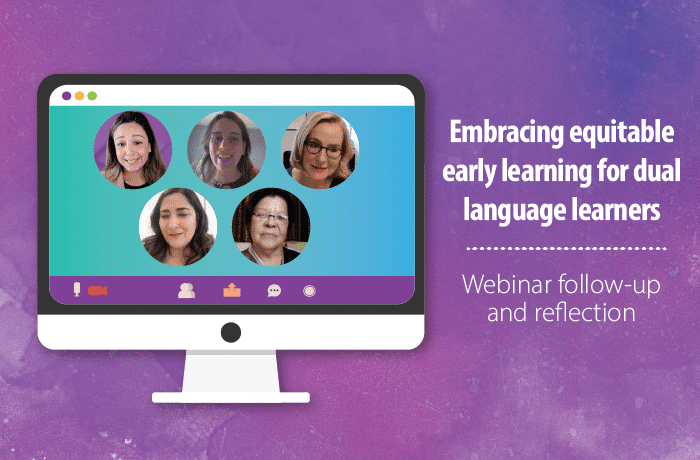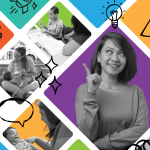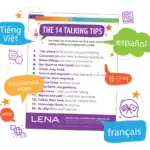“It’s fair to say that dual language learners need exactly the same thing that other children need when it comes to early childhood education. They need supportive environments and responsive relationships with teachers. But dual language learners also have very unique needs. The question here is: How do we ensure that we provide them with the support that they need?”
This was how Nathalia Bustamante, Strategic Partnerships Manager at LENA, opened our webinar about dual language learners in child care.
“You have it already in your heart. Get rid of your fear. Go for it. Try.”
And that was the exclamation point with which Pilar Fort, of Whole Child International, closed the webinar.
Both were sending a powerful message to early educators:
Collectively, we’re tackling the long-term process of advocating for policy changes, professional development opportunities, and wholesale reversals of biases against multilingualism. In the meantime, educators themselves have the power to lead from within the classroom, to be intentional in nurturing their relationships with dual language learners.
Interactions between monolingual teachers and dual language learners
Dr. Jill Gilkerson, Chief Research and Evaluation Officer at LENA, presented data showing that teachers tend to exchange fewer conversational turns with children who do not speak their primary language, especially in preschool classrooms.
Conversational turns, or serve-and-return interactions, are a key metric both for predicting child outcomes and understanding children’s individual experiences in infant, toddler, and preschool classrooms. Conversational turns are measured by LENA technology, sometimes called a “talk pedometer” or a “FitBit for conversation.
And yet the data analysis also shows that bilingualism is absolutely an asset. One way this bears out: Bilingual teachers are, on average, significantly more effective at engaging in conversational turns with the children in their care.
The dual language learner child’s perspective
Fort made clear that teachers themselves are not to blame for the situation that Dr. Gilkerson’s data analysis describes. However, she also suggested we imagine ourselves in the position of a dual language learner experiencing less interaction than their peers. It’s isolating and lonely, as if they are “on their own in this tremendous world.”
Double standards around bilingualism
Dr. Anne Larson, Research Associate at the Center for Applied Research and Educational Improvement at the University of Minnesota, discussed the importance of moving away from a deficits-based and toward a strengths-based understanding of multilingualism. In the U.S., double standards and discrepancies between white families and racialized families are still all too pervasive.
Creating fairness through policy
Victoria Tafoya, Program Officer at the W. K. Kellogg Foundation, advocated for creating more just early learning environments through policy and professional development.
Centering impartial linguistics in the classroom
Tafoya also spoke on how important it is for educators and administrators to truly engage with multilingual families, to “position ourselves as learners,” to “being open to exploring the linguistic and cultural practices of the children,” to “being vulnerable.”
Talking about multilingualism using strengths-based terminology
One way to work toward centering fairness in the classroom: ensuring that we talk about one child’s multilingualism as an asset for all, and also remembering that multilingualism is the norm throughout the world.
“You have it already in your heart.”
Finally, back to Fort’s exclamation point.
Yes, there are strategies that monolingual English-speaking teachers can use to better engage with their dual language learners. And yes, there will always be strides to make in improving policies and mindsets. But there’s also the one-of-a-kind power that early childhood educators have: to reach young children, to give them time and space to learn and grow, and to form truly responsive relationships.
[webinar]



